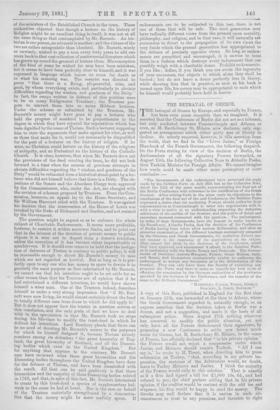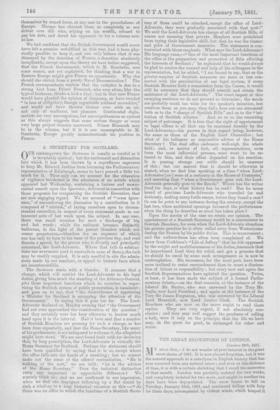THE BETRAYAL OF GREECE.
THE betrayal of Greece by Europe, and especially by France, has been even more complete than we imagined. It is asserted that the Conference of Berlin did not act as a tribunal, but only mediated between Constantinople and Athens, or oven, as M. Barthdlemy St. Hilaire now declares, only sug- gested an arrangement which either party was at liberty to decline. So utterly removed, however, is this assertion from the truth, that we find in the " Livre Jaime," or Foreign Blue-book of the French Government, the following despatch. On the Porte stating its view of the decision of Berlin, the Ambassadors of all the signatory Powers forwarded, on
August 25th, the following Collective Note to Abbedin Pasha, then Turkish Minister for Foreign Affairs. We cannot imagine how words could be made either more peremptory or more conclusive :-
"The Governments of the undersigned have examined the reply made by the Sublime Porto on July 26th last to the Collective Note, dated the 16th of the same month, communicating the final act of the Berlin Conference with reference to the rectification of the Greek frontier. After setting forth in the same reply its objections to the conclusions of the final act of the said Conference, the Sublime Porte expressed a desire that the mediating Powers should authorise their representatives at Constantinople to enter into negotiations with it, with a view to arrive at an understanding respecting the definitive settlement of the outline of the frontier, and the points of detail and secondary moment connected with the question. The undersigned, by order of their Governments, have the honour to make known to his Excellency, Abbedin Paella, that the decision of the Conference of Berlin having been taken after mature deliberation, and after an attentive examination of the different tracings successively proposed by the Ottoman and Greek Governments, the mediating rowers can- not consent to the reopening of the negotiations on the subject. They cannot but abide by the decisions of the Conference, which they have approved, and recommend it afresh to the Sublime Porte, as in conformity with the Berlin Treaty and Protocols. The Govern- ments of Germany, Austria-Hungary, France, Great Britain, Italy, and Russia find themselves consequently unable to authorise the undersigned to accept any discussion as to the delimitation of the frontier. They can only leave them the faculty of examining any proposal the Porto may have to make as regards the best mode of effecting the evacuation by the Ottoman authorities of the territories specified by the decision of the Conference, and the transfer of the same to the Ilellenic Government."
" HATZFELDT, CAL10E, TISSOT, GEORGE N
GOSCIIEN, L. COKT1, OVINOW." A copy of this Note, published in England for the first time on January 27th, was forwarded at the time to Athens, where the Greek Government regarded it, naturally enough, as an express assertion that the decision taken at Berlin was a decree, and not a suggestion, and made it the basis of all subsequent action. Since August 27th nothing whatever has occurred to modify the public situation, yet not only have all the Powers dishonoured their signatures, by proposing a new Conference to settle new terms much worse for Greece, but M. Bartheilemy St. Hilaire, in the name of France, has officially declared that " in his private opinion " the Powers would not reject a compromise under which Janina and Metzovo should remain Turkish. " All I can say is," he wrote to M. Tissot, when directing him to press arbitration on Turkey, " that, according to my private im- pression, the sentence of the Arbitrators would, no doubt, leave to Turkey Metzovo and Janina. I think the majority of the Powers would rally to this solution." That is exactly as if a firm had signed a bill for £1,000 10s. 'id., and had refused to pay, the chief partner adding that in his private opinion, if the creditor would be content with the odd ten and sixpence, his firm would be happy to send the money. The Greeks may well declare that it is useless in such cir- cumstances to trust to any promises, and threaten to right
themselves by armed force, at any cost to the peacefulness of Europe. Europe has cheated them as completely as any debtor over did who, relying on his wealth, refused to pay his debt, and dared his opponent to try a ruinous suit- at-law.
We feel confident that the British Government would never have left a promise unfulfilled in this way, had it been phy- sically possible to keep it, and can only believe that it was dismayed by the desertion of France, a desertion absolutely inexplicable, except upon the theory we have before suggested, that the French Government, which is M. Gambotta, sees some reason, not yet explained, for thinking that a war in Eastern Europe might give France an opportunity. Why else should she shrink from a purely Naval Demonstration ? The French correspondents explain that the volteface is due to a strong hint from Prince Bismarck, who very often, like the typical Irishman, thinks a kick a hint ; but in that case France would have pleaded the opinion of Germany, or have receded " in face of obligatory, though regrettable national necessities," and would not have thrown Greece over with an air, not only of readiness, but pleasure. Continental diplo- matists are very unscrupulous, but unscrupulousness so cynical as this always suggests that some serious danger or some very large project remains unavowed. Prince Bismarck may be in the scheme, but if it is one unacceptable to M. Ganabetta, Europe greatly Misunderstands his position in France.







































 Previous page
Previous page